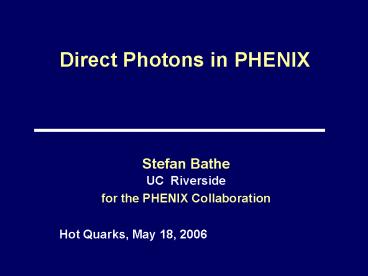Direct Photons in PHENIX - PowerPoint PPT Presentation
Title:
Direct Photons in PHENIX
Description:
Measure pT spectrum of p0 and h mesons with high accuracy ... Hisayuki Torii, JPS '05 (spring) d Au: initial-state nuclear effects ... – PowerPoint PPT presentation
Number of Views:25
Avg rating:3.0/5.0
Title: Direct Photons in PHENIX
1
Direct Photons in PHENIX
- Stefan Bathe
UC Riverside - for the PHENIX Collaboration
Hot Quarks, May 18, 2006
2
Why direct photons?
- Hadrons affected by medium created in AA
collision - Carry information about final state
- Photons dont strongly interact
- Exit medium unscathed
- Carry information about initial state
- Provide calibrated baseline
3
Direct Photons
- Experimenters definition
- not from hadronic decays
- Elementary processes
- compton
- annihilation
- bremsstrahlung fragmentation
4
Measurement of Direct Photons
- Get clean inclusive-photon sample
- e.g. subtraction of charged particle background
- Measure pT spectrum of p0 and h mesons with high
accuracy - Calculate number of decay photons per p0
- Usually with Monte-Carlo
- mT scaling for h, w,
- FinallySubtract decay background from inclusive
photon spectrum
5
PHENIX Setup
- Central spectrometer arms h lt 0.35
- g, p0 via p0 ? gg
- EMCal
- Lead scintillator calorimeter (PbSc)
- Lead glass calorimeter (PbGl)
- Charged particles
- DC, PC
- e ID
- RICH
- Muon arms (not shown, forward rapidity)
6
Direct Photons in pp
- Test of QCD
- direct participant in partonic interaction
- Less dependent on FF than hadron production
- Reduce uncertainty on pQCD photons in AA
- good agreement with NLO pQCD
- Important baseline for AuAu
7
Direct g in dAu
- dAu
- initial-state nuclear effects
- no final-state effects (no medium produced)
- Study initial-state effects
pp and dAu spectra compared to NLO pQCD
- consistent with 1
- No indication for initial-state effects
- But large uncertainties
ratio to NLO pQCD
8
Hard Direct Photons in AuAu
- Large direct photon excess
- Photons dont strongly interact with medium
- Allow test of Ncoll scaling for hard processes
- Important for interpretation of observed high-pT
hadron suppression
Expectation for Ncoll scaling of direct photons
holds for all centrality classes
9
Direct Photon RAA
- p0 suppression caused by created medium
PRL 94, 232301
- direct photons not suppressed
p0s suppressed
10
Other Modifications of Ncoll scaling?
For instance fragmentation photons?
fragmentation contribution ()
- fragmentation contribution substantial in pp
- parton energy loss in QGP reduces fragmentation
contribution in AuAu - compensated by induced photon bremsstrahlung in
QGP
Bremsstrahlung
- Effects cancel?
- Potentially many more modifications of direct
photon production
11
Going to intermediate pT
- AuAu
12
Expected photon sources
Turbide, Rapp, Gale, Phys. Rev. C 69 (014903),
2004
- Window for thermal photons from QGP in this
calculationpT 1 - 3 GeV/c
13
Limitation of Calorimeter Measurement
PRL 94, 232301
- No significant excess at low pT
14
A new technique opening up the phase space
pT
Minv
0
15
The Idea
- Start from Dalitz decay
- Calculate invariant mass distribution of Dalitz
pairs
invariant mass of virtual photon
invariant mass of Dalitz pair
invariant mass of Dalitz pair
invariant mass of virtual photon
phase space factor
form factor
phase space factor
form factor
- Now direct photons
- Any source of real g produces virtual g with
very low mass - Rate and mass distribution given by same formula
- No phase space factor for meeltlt pT photon
16
In Practice
- Material conversion pairs removed by analysis cut
- Combinatorics removed by mixed events
0-30
90-140
200-300
140-200 MeV
Rdata
- Calculate ratios of various Minv bins to lowest
one Rdata - If no direct photons ratios correspond to Dalitz
decays - If excess direct photons
17
(No Transcript)
18
(No Transcript)
19
S/B1
p0
20
S/B1
calculated from Dalitz formula
p0
measured
21
S/B1
calculated from Dalitz formula
p0
measured
22
S/B1
calculated from Dalitz formula
p0
measured
23
Comparison to Conventional result
24
The Spectrum
Compare to published Run2 result PRL94 232301
25
gdirect
- preliminary direct photon spectrum at 1-5 GeV/c
from g
26
The Spectrum
Compare to NLO pQCD
- L.E.Gordon and W. Vogelsang
- Phys. Rev. D48, 3136 (1993)
- above (questionable) pQCD
27
The Spectrum
Compare to NLO pQCD
- L.E.Gordon and W. Vogelsang
- Phys. Rev. D48, 3136 (1993)
- above (questionable) pQCD
Compare to thermal model
- D. dEnterria, D. Perresounko
- nucl-th/0503054
21 hydro T0ave360 MeV(T0max570 MeV) t00.15
fm/c
- data above thermal at high pT
28
The Spectrum
Compare to NLO pQCD
- L.E.Gordon and W. Vogelsang
- Phys. Rev. D48, 3136 (1993)
- above (questionable) pQCD
Compare to thermal model
- D. dEnterria, D. Perresounko
- nucl-th/0503054
21 hydro T0ave360 MeV(T0max570 MeV) t00.15
fm/c
- data above thermal at high pT
Compare to thermal pQCD
- data consistent with thermal pQCD
29
The Spectrum
Compare to NLO pQCD
- L.E.Gordon and W. Vogelsang
- Phys. Rev. D48, 3136 (1993)
- above (questionable) pQCD
Compare to thermal model
- D. dEnterria, D. Perresounko
- nucl-th/0503054
21 hydro T0ave360 MeV(T0max570 MeV) t00.15
fm/c
- data above thermal at high pT
Compare to thermal pQCD
- data consistent with thermal pQCD
- Needs confirmation from pp measurement
30
Conclusions
- pp
- Established baseline measurement of hard photons
- More precise measurement about to be published
- dAu
- Investigated initial-state effects
- Needs higher-statistics run
- AuAu, high pT
- Confirmed binary scaling of pp baseline
- Established hadron suppression as medium effect
- AuAu, intermediate pT
- Promising new technique for measuring direct
photons in HI collisions through internal
conversion - Excess of direct photons from g above
decay-photon background - Data consistent with thermal pQCD
- However
- pQCD calculations questionable at low pT
- Needs confirmation from pp measurement with same
technique - Direct photon sources other than thermal might
contribute as well
31
(No Transcript)
32
- Gale QM05































